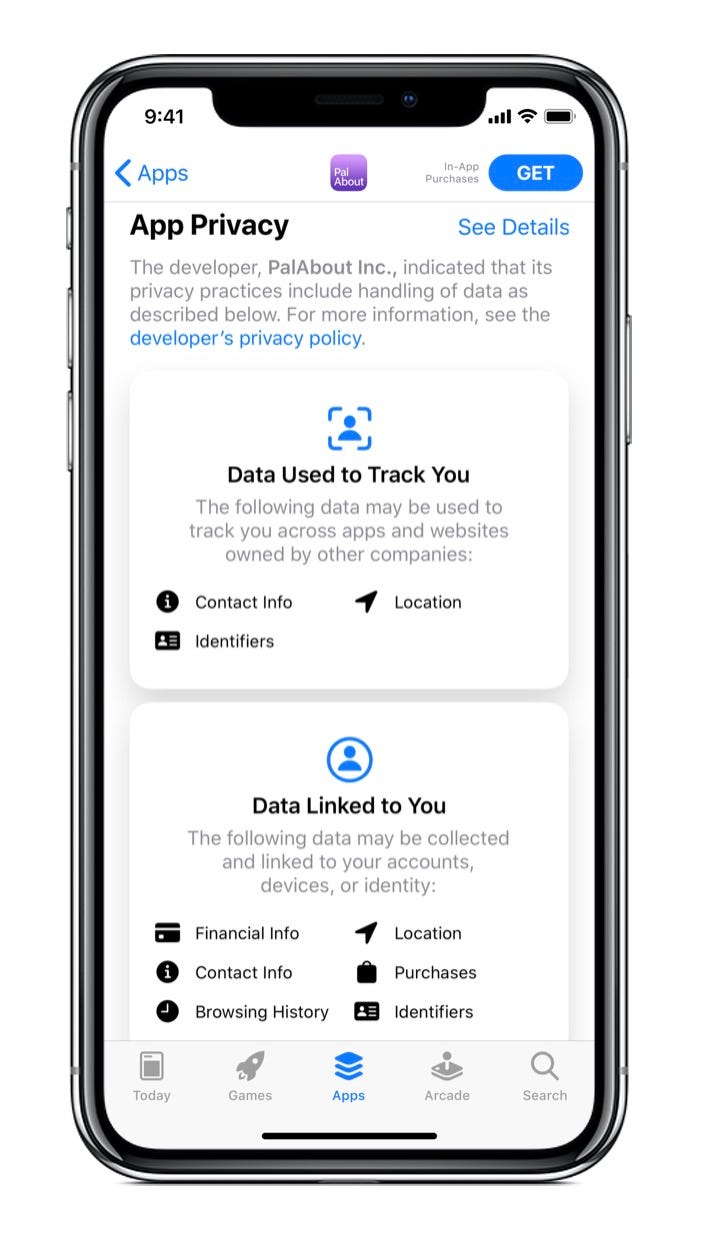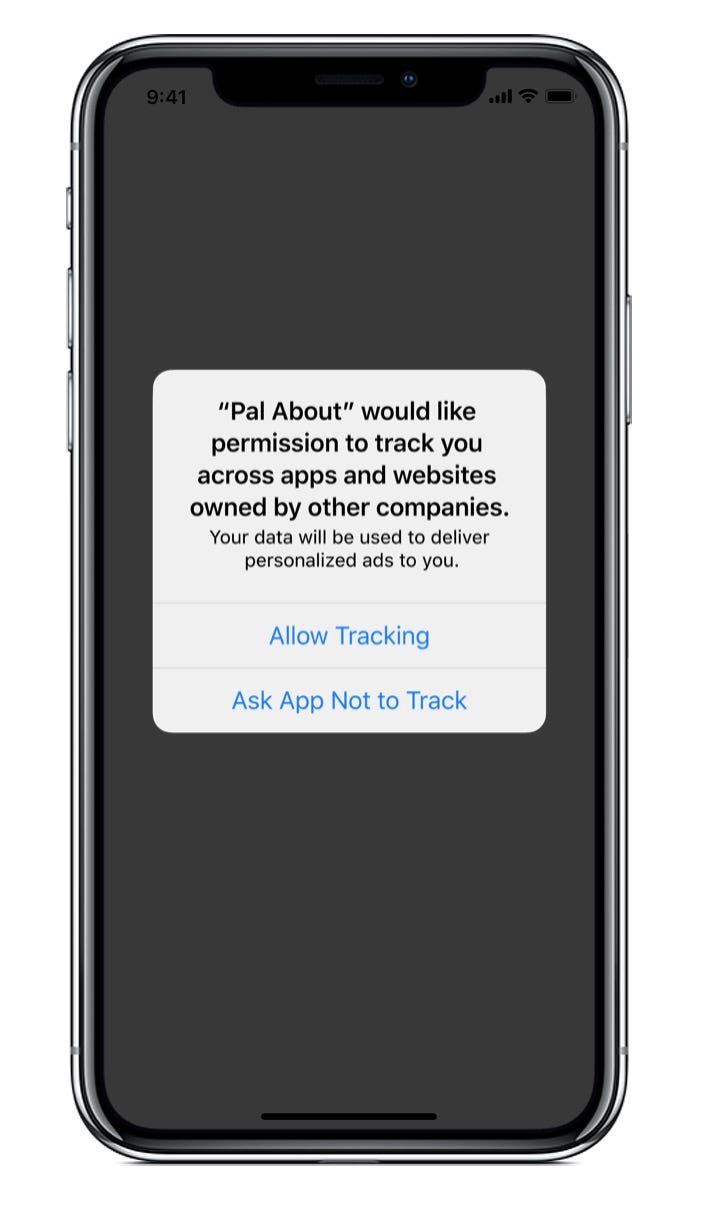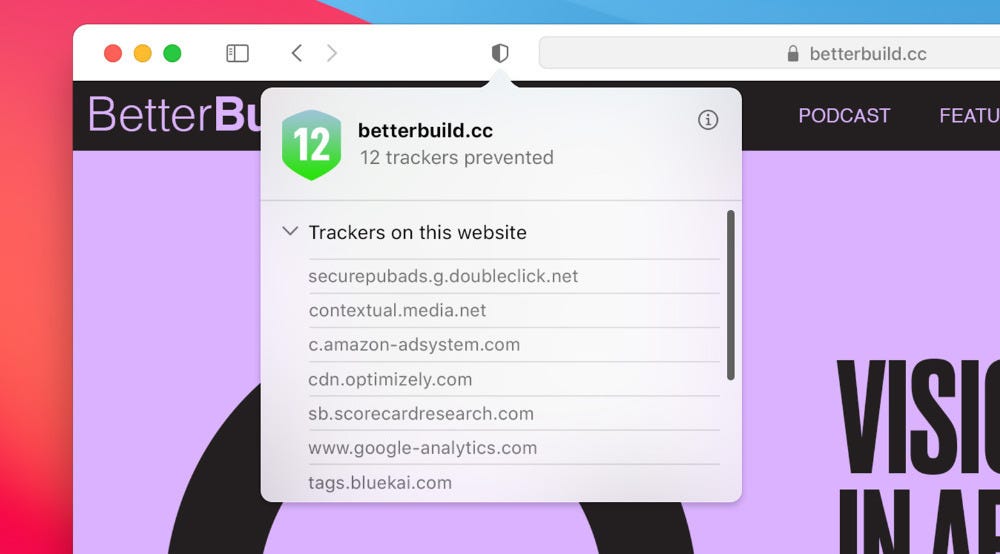蘋果手機隱私分析數據是什么
重點 (Top highlight)
Moving beyond the rollercoaster of excitement and controversy Apple has been in for the last week, there was one thing in the WWDC keynote that stood out for me. One thing I really appreciated seeing. There is something special about Apple’s commitment to privacy.
在過去的一周里,Apple 超越了激動和爭議的過山車,在WWDC主題演講中有一件事對我來說很突出。 我真的很高興看到一件事。 蘋果對隱私的承諾有一些特別之處。
Despite the amount of articles, podcasts and controversies around privacy in the last five to ten years, it feels like little of importance has been said or done. With a few exceptions nothing really moved, we are just deeper in the trenches, more resigned towards change. The only meaningful adaptation we’ve seen from the Big Tech has been akin to greenwashing. Big Tech learned to talk like privacy is important, but hasn’t actually changed their services.
盡管在過去的五到十年中,有關隱私的文章,播客和爭議頗多,但似乎人們幾乎沒有說過任何重要的事情。 除了少數例外,什么都沒有真正動彈,我們只是更深入地思考,更樂于尋求變革。 我們從大技術中看到的唯一有意義的調整就是綠色清洗。 大技術學會了像隱私一樣重要的談話,但實際上并沒有改變他們的服務。
Facebook makes privacy the user’s problem — their main response to various controversies has been adding privacy toggles anywhere, allowing you to customise who sees your updates. Ironically, the Facebook’s privacy problem has never been so much the people on the platform, but the Facebook platform itself. This is akin to a fashion or soft drink giant making the ecological impact of their products the user problem. Is ‘privacywashing’ a term?
Facebook使隱私成為用戶的問題-他們對各種爭議的主要回應是在任何地方添加了隱私切換,從而允許您自定義誰可以看到您的更新。 具有諷刺意味的是,Facebook的隱私問題從來沒有像平臺上的人那樣重要,而是Facebook平臺本身。 這類似于時尚或軟飲料巨頭,使他們產品的生態影響成為用戶的問題。 “隱私清洗”是一個術語嗎?
In this whole mess, Apple stands out. They are contributing something meaningful to the privacy debate. Something that seems subtle and unexceptional, but after a few of these WWDC’s with ‘privacy updates’, becomes really clear. Apple is employing something, that I’ve come to call a user-centered approach to privacy. Here’s what I mean by this.
在整個混亂中,蘋果公司脫穎而出。 他們為隱私辯論做出了有意義的貢獻。 看起來有些微妙而平凡的事情,但是在其中一些帶有“隱私更新”的WWDC之后,就變得很清楚了。 蘋果正在采用某種方法,我將這種方法稱為以用戶為中心的隱私保護方法。 這就是我的意思。
歡迎來到以用戶為中心的隱私 (Welcome to user-centred privacy)
After user-centered design, a definition might look something like: User centred privacy is an approach to privacy where designers focus on the needs of the user on every step of the process.
在以用戶為中心的設計之后,定義可能類似于: 以用戶為中心的隱私是一種隱私保護方法,設計人員在流程的每個步驟上都將重點放在用戶的需求上。
Once you adopt the approach of being user-centered, things become simple. There is really just one law governing this approach to privacy. And in context of privacy today, it’s a controversial and radical one, with far reaching consequences. That one law is:
一旦采用以用戶為中心的方法,事情就會變得簡單。 確實只有一部法律管轄這種隱私保護方法。 在當今的隱私環境中,這是一個有爭議的激進主義者,其后果是深遠的。 一條法則是:
Privacy is what the user expects privacy is.
隱私是用戶期望的隱私。
Not what a given app on the App Store or website thinks privacy is. Not even what Apple thinks privacy is. Just what the user expects. This has consequences, most notably:If I (user) don’t expect an app to be tracking a specific behaviour and it’s tracking that specific behaviour, the app is in the wrong — it should tell me about it or give me a choice before I commit any of my data.
不是App Store或網站上給定應用程序所認為的隱私。 甚至沒有蘋果認為的隱私。 正是用戶所期望的。 這會產生后果,最明顯的是: 如果我(用戶)不希望某個應用程序正在跟蹤特定的行為并且正在跟蹤該特定行為,則該應用程序有誤 -它應該告訴我有關信息或在選擇之前給我一個選擇我提交任何數據 。
As of iOS 14 and macOS Big Sur, Apple will let users know about the data collection practices of a given app. They call this a ‘nutrition label’ for data. This let’s the user make the choice before they give any data up. It seems they will also block web trackers.
從iOS 14和macOS Big Sur開始,Apple將讓用戶了解給定應用程序的數據收集做法。 他們稱此為數據的“營養標簽”。 這讓用戶在放棄任何數據之前做出選擇。 看來他們還將阻止Web跟蹤器。



We see Apple experimenting with different approaches here, and it’s likely they’re just staring out and seeing how their ecosystem might look with user-centered privacy in mind. See more information on their Developer pages.
我們看到蘋果在這里嘗試了不同的方法,很可能他們只是盯著眼睛,看看他們的生態系統在考慮以用戶為中心的隱私方面的樣子。 在其開發人員頁面上查看更多信息。
For me, as a product maker and designer, the takeaway of this approach is this: it’s the customer, who ultimately holds the definition of privacy, not me, my company, or my third-party providers. We all feel this intuitively when we’re customers. That’s why most tech people use ad blocking plugins.
對我而言,作為產品制造商和設計師,這種方法的外在之處在于: 最終由客戶來定義隱私的是客戶,而不是我,公司或第三方提供商。 當我們是客戶時,我們都會直觀地感受到這一點。 這就是為什么大多數技術人員都使用廣告攔截插件的原因。
But as makers, we seem to immediately forget. Adopting the user-centered approach, our job becomes to educate the user to our privacy practices and give them a choice, when they expect to be given a choice. Or change our practices where they’re dishonest.
但是作為制造商,我們似乎立即忘記了。 通過采用以用戶為中心的方法,我們的工作就變成教育用戶了解我們的隱私慣例,并在他們期望被選擇時給他們選擇。 或者在不誠實的地方改變我們的做法。
I’m taking this approach with me and using it intentionally on all the work I’ll do from now on. It takes privacy out of the realm of politics and opinion and into the realm of design, where it can be measured, iterated and improved upon.
我正在采用這種方法,并有意將其用于以后我將要完成的所有工作。 它將隱私從政治和輿論領域帶入設計領域,在這里可以對其進行度量,迭代和改進。
Hi, I’m Milosz Falinski, the author of this post! I consult mission-led startups on finding product-market fit and maximising positive impact they have on the world.
嗨,我是Milosz Falinski,該帖子的作者! 我咨詢特派團領導的初創公司,以找到適合市場的產品并最大程度地發揮其對世界的積極影響。
If you liked this post, visit my site for a free email course to support you in finding product-market fit and more awesome articles you won’t find here!
如果您喜歡這篇文章, 請訪問我的網站 以獲取免費的電子郵件課程,以支持您找到適合產品市場的產品以及您在這里找不到的更出色的文章!
翻譯自: https://blog.prototypr.io/what-can-apples-user-centered-approach-to-privacy-teach-us-about-making-privacy-accessible-e5555a27c03f
蘋果手機隱私分析數據是什么
本文來自互聯網用戶投稿,該文觀點僅代表作者本人,不代表本站立場。本站僅提供信息存儲空間服務,不擁有所有權,不承擔相關法律責任。 如若轉載,請注明出處:http://www.pswp.cn/news/275389.shtml 繁體地址,請注明出處:http://hk.pswp.cn/news/275389.shtml 英文地址,請注明出處:http://en.pswp.cn/news/275389.shtml
如若內容造成侵權/違法違規/事實不符,請聯系多彩編程網進行投訴反饋email:809451989@qq.com,一經查實,立即刪除!















)


